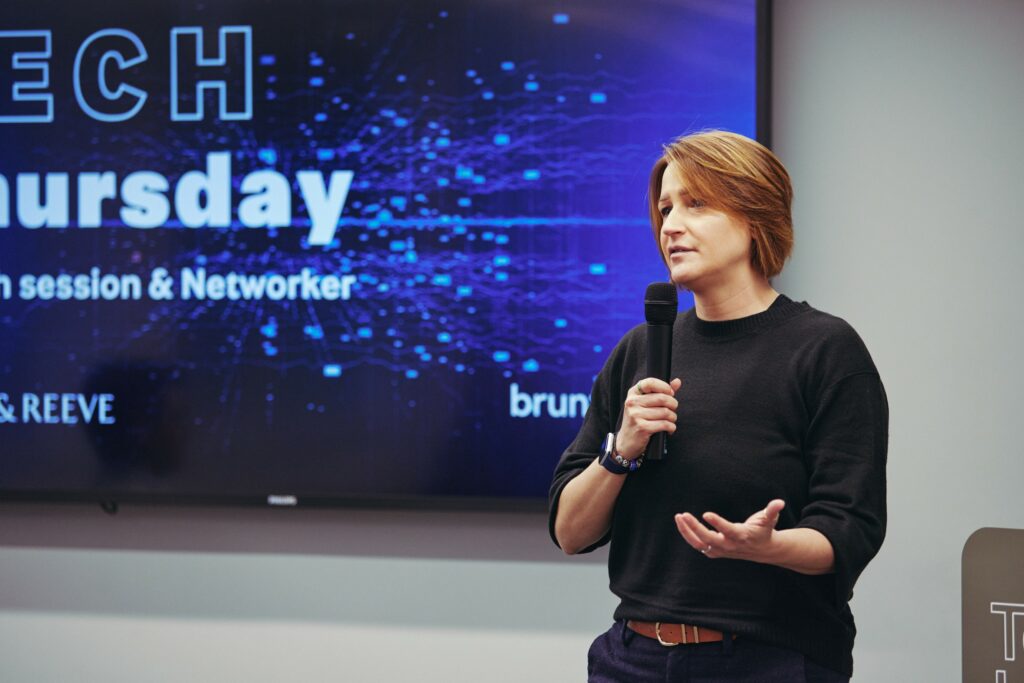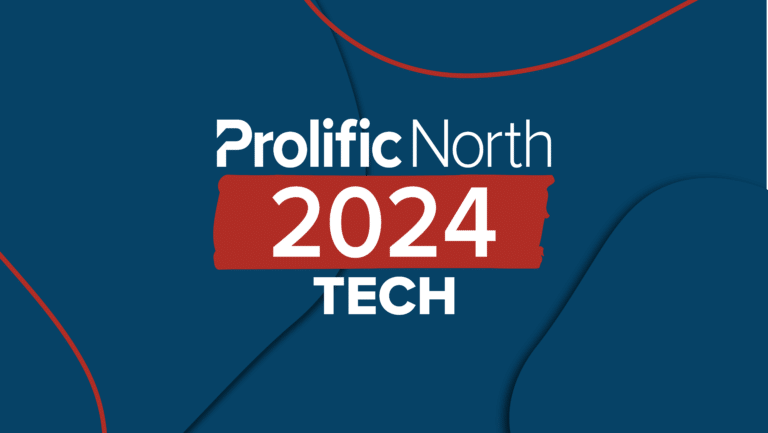Between mass job cuts at global tech firms, VCs tightening purse strings and AI doomsayers, 2023 hasn’t been the easiest of years for the tech sector.
Earlier in the year, the collapse of Silicon Valley Bank was an uneasy start for a number of Northern tech companies until HSBC’s last minute rescue deal.
Forget the metaverse, AI was the hottest topic across every industry – not just the tech sector – which will undoubtedly continue in 2024. Despite the buzz around AI’s potential, there were stark warnings about the threat it poses to democracy, jobs and security. We chatted to tech secretary Michelle Donelan during a visit to US firm PsiQuantum’s brand new lab at Sci-Tech Daresbury, but she was unable to name any Northern tech companies.
But there’s been plenty of good news across the North, from established tech companies expanding overseas, a fresh wave of new start-ups emerging, and the Department for Science, Innovation and Technology (DSIT) set to open a second HQ in Salford.
Prolific North continued to shine a spotlight on the tech sector, showcasing 20 Tech Companies to Watch across the North for the second year in a row where you’ll find start-ups using AI to tackle child labour in supply chains, to businesses using tech to support mental health issues.
From quantum computing to sustainability and, of course, AI, we’ve spoken to a handful of tech leaders across the North and gathered their insights, trends and predictions for the year ahead…
Aaron Harris, Chief technology officer, Sage

In the world of business technology, we’re anticipating that 2024 will be the year that’ll bring a sharper focus on the development of trusted technology solving for real customer challenges. Large Language Models (LLMs) and digital assistants will fundamentally reshape the way people interact with software in both their personal and professional lives. We’ve already seen businesses starting to adopt AI technology and many IT decision-makers are keen to implement more AI into their workflows to streamline operations and cut out repetitive manual tasks.
However, this shift will only occur if humans can trust the technology to do the job safely and competently. That’s why, now more than ever, the people developing AI and the people using it need to work hand in hand to make sure AI lives up to its potential. The North East in particular has a role to play in the development of trusted AI, with its world class engineering talent and the recent investment in the UK’s AI data centre infrastructure.
Simon Benson, Immersive technology director, IN4 Group

The video games sector has seen incredible growth over its relatively short history. Looking forward, it’s highly likely that we will see video games migrate to cloud-streamed delivery, meaning that we won’t need a gaming PC or console to play the best games, just our smart TVs or smartphones. This in turn is likely to lead to subscription-based models much like the way we consume movies on Netflix. These changes will make video gaming much more accessible to a wider audience – we may even see video games and movies blend together on common platforms.
Imagine a future Star Wars movie being released and when you search for it on your smart TV, you get the option to watch it or play it. Technologies such as AI and XR are likely to have a huge impact on the gaming experience too, making game characters and online players appear much more human. This coupled with advancements in photo-realistic CGI will also bring us closer to the Star Trek holodeck experience, turning what was once a sci-fi vision of the future into our everyday gaming experience.
Alice Spreckley, Managing director, Naimuri

We have seen within 2023 the surge in visible advancement of AI. Not just within the technology sector but its application across all sectors of industry and society. Along with this though, we’ve also seen a surge in concern about this advancement: alongside the many potential benefits, a consideration of the risks of AI and what could go wrong, and what we should be doing about those risks. This is one area where I envisage a real focus in 2024. Increasing AI may be inevitable, but we will want to ensure it’s ethical, unbiased and trustworthy and we will want to govern AI to make sure it is traceable, explainable, secure and reliable. To support this, robust AI assurance frameworks and tooling will be critical.
Sarat Pediredla, CEO, hedgehog lab

As we look towards 2024, a key trend in the tech world is the increasing convergence of Artificial Intelligence (AI) with other emerging technologies, creating a landscape ripe for innovation. AI is set to become even more integrated into our daily lives, primarily through the Internet of Things (IoT). This integration means smarter homes, more efficient workplaces, and even cities that adapt to our needs in real time.
Another significant area is the advancement of AI in healthcare. AI-driven diagnostic tools and personalised treatment plans are expected to become more mainstream, offering more accurate diagnoses and tailored therapies. This shift not only enhances patient care but also streamlines healthcare management.
In business, we’re likely to see AI-driven analytics becoming a staple. Businesses will increasingly rely on AI to interpret vast amounts of data, providing insights that drive strategic decision-making.
Ian Cairns, Enterprise director, TalkTalk Business

The impact of AI: It’s no secret that businesses across a broad range of industries have embraced new AI technologies and are already feeling the benefits. The retail, hospitality and logistics sectors are rapidly moving towards a new era of automation, so I expect 2024 will see game-changing transformations across these industries.
The challenge now is how businesses use AI to interpret data, to ultimately help them make decisions that add real value.
The impact of AI on retail: The Internet of Things (IoT) continues to create vast volumes of data across retail businesses. This data is now being gathered not just by traditional IT systems, but by sophisticated devices such as CCTV or 3D LiDAR technology.
“We’ve already witnessed supermarkets make use of AI to help with traditional challenges like reducing theft and optimising stock management, as well driving efficiencies in other areas such as power consumption. It will be exciting to see how the technology evolves in 2024, and the innovations this can unlock for retail businesses.
The impact of AI on logistics: Through our work, we’ve seen the logistics sector increasingly eager to utilise AI and the data it can interpret to improve safety. For example, AI can be used to identify behaviours such as smoking in petrol stations or other dangerous areas. It can also help improve efficiencies through ANPR recognition, which can give easier access to the right vehicles into secure areas.
AI is shaping up to be the future of logistics and supply chain management. Ahead of the new year, businesses should ensure that they have the network infrastructure in place to support new technologies. A strong, reliable, and secure network is a crucial foundation for any business wishing to undergo digital transformation in 2024.
Deb Hetherington, Head of Innovation, Bruntwood SciTech

You may have heard of quantum computing; it’s been heralded as the next wave of computational innovation that will open vistas for groundbreaking computing capabilities. There is no question that quantum computing has the potential for huge impact in areas from enterprise to science, but it also raises concerns around cybersecurity and cost.
So, what is quantum? In as simple terms as possible to describe something vastly complicated; the computing technology relies on principles of quantum theory and measures electrons or photons which are subatomic particles known as ‘qubits’. As opposed to traditional computing which operate in a binary system using 1s and 0s, and this information is transmitted through quantitative measurements called ‘bits’. With quantum, equations aren’t limited to 1s and 0s, they can transmit information in which particles exist in both states (1 and 0 at the same time). The innovative impact of this is not to be underestimated, the unique properties of qubits mean they can solve certain classes of problems faster and more efficiently than traditional computers, sometimes taking minutes where those traditional computers would have taken years.
You may be asking why isn’t this technology impacting your day-to-day life already, well it doesn’t come without its drawbacks. If I asked you where you thought the coldest place in the world was, chances are you’d say Alaska, or Antarctica. It’s actually a warehouse outside of California run by quantum computing firm Rigetti. Qubits can only currently function at incredibly low temperatures, and the cryptogenic refrigerator that houses them cools the qubits to 0.003 kelvin (-273 degrees celsius). This is obviously not a practical environment for the daily use of a computer. Another drawback is the cyber security risk it poses. It has been suggested that quantum computing could crack existing encryption methods, creating all kinds of ethical and security issues with regards to industry standards. And these issues are nothing in comparison to the economic implications of full deployment. Instead of the usual economies of scale that come with a technology rollout and adoption, quantum computing is actually becoming more expensive, leaving many to question the commercial viability of further development.
Nevertheless, if you give smart people innovative technology, great things will happen and if society wants answers to some of the most challenging questions of the 21st century, do we really have an option? As we approach 2024, quantum computing will likely take a huge step forward in development, with the likes of IBM, Google and Microsoft all having ploughed major resources into its development over the past decade. Much like the early stages of the world wide web and traditional computing, quantum will start with small scale applications but will quickly become ubiquitous across our daily social and economic lives.
Nick Sacke, IoT Solutions Lead, Connexin

In 2024 we expect to see more development in the smart buildings and water utilities sectors. We are already witnessing the beginnings of decarbonising our buildings and smart technology will continue to create big waves as sustainability becomes more and more a priority for businesses in the wake of the energy crisis. The infrastructure sector is also starting to adapt to create properties that support citizens for better health and resilience during climate change.
A large part of this movement will be the implementation of IoT sensors at scale which will allow businesses to collect large volumes of data to create insight into how buildings are performing – whether this be how many people are occupying a building or room, or the amount of electricity being used by key heating, cooling and lighting systems, and how frequently. This will promote better working and living conditions and increase sustainability by monitoring any potential impact on the environment.
Across the water utilities sector, smart metering is already gaining traction and rapidly expanding as the North of England continues to lead this digital transformation. Smart metering will work hand in hand with the data generated by IoT sensors to give communities a clearer view of the water consumption in their homes, allowing for more accurate billing and identifying areas to reduce excessive usage or expenditure.
Michael Gibson, CEO, Fuuse

The transition from fossil fuels to electricity is one of the biggest opportunities for businesses across the North. Despite the government rolling back on some of its net zero policies, electric vehicles, charging infrastructure, solar, renewable energy, battery storage and heat pumps, and how they optimally work together is already one of the key growth areas of the economy, creating huge opportunities to decarbonise and save huge sums for businesses. 2024 will see a significant advance of those digital businesses supporting the transition to electricity as innovation plays a huge part in scaling the market. Over £4bn will be spent next year on net zero infrastructure in the North alone and the government is supporting UK tech businesses with over £100 million in net zero focused funding through Innovate UK. (Michael Gibson pictured, right.)
Ibrar Hussain, Technical director, 26

- AI, Generative AI and Machine Learning – AI and ML technologies have penetrated the market, especially in the retail industry, which in many ways has acted as a testing ground for learning more about consumers and their habits. GenAI which creates various types of content like text, images and audio will be the next gen-focus without a doubt. Although GenAI highlights an immense number of challenges with ethical and moral considerations, it’s a tool that is spreading like wildfire.
- Big data using personal data to create more personalised experiences – Big data is helping gain traction and a deeper understanding of consumer shopping habits, helping create a more personalised experience and provide more insightful market intelligence. Taking this one step further, retailers can also leverage cloud data integration solutions and ecommerce data software to combine data from various channels and use analytics platforms powered by AI and ML to gain further insights.
- Automation – Businesses are beginning to see automation as an enabler to help their staff focus their efforts on creative and innovative thinking instead of blindly entering numbers in a spreadsheet. This trend will continue more in 2024 which will see significant benefits such as reduced human error and quicker time to market for products.
- AR and VR – The introduction of AR by Ikea allows you to visualise furniture items in your home, it now sets the trend for the increasing use of AR and VR.
- Use of chatbots to improve shopping experience
- Headless and API-driven ecommerce for greater flexibility, agility and scalability
- Sustainability will be integrated into every aspect of a business, from tech and operations to their employee engagement and retention.
Naomi Timperley, Growth and innovation consultant and co-founder of Tech North Advocates

By the year 2024, Artificial Intelligence (AI) is expected to continue its journey building upon the advancements made in 2023. As AI becomes more integrated into sectors we can anticipate noteworthy trends and predictions:
- Holistic knowledge management – AI will revolutionise knowledge work by automating tasks, allowing workers to dedicate their time and energy to high value activities. This shift aims to boost productivity and enhance customer experiences.
- The role of generative AI – Generative AI will have an impact on knowledge work, as it facilitates the automation of data classification and enables natural language interactions. This advancement will unlock levels of efficiency and insights by harnessing data from sources such as documents and virtual communications.
- Emphasising ethical AI – AI ethical considerations will gain attention due to regulatory focus. Organisations will be required to ensure that their AI solutions are based on quality and ethically sourced data. Larger Language Models (LLMs) will be used cautiously with their outputs considered as recommendations than instructions, supported by regular audits and human oversight.
- Generative AI in Financial Services – While Generative AI holds promise for achieving efficiencies in the sector, it also faces challenges related to customisation, reliability and regulatory compliance. Its potential in areas like investment decision-making is approached cautiously with a need for assessment of safety and security concerns.
Data integration and management will play a role in the implementation of AI. Organisations will prioritise providing AI tools with accurate data. AI assistants are expected to become more specialised and tailored to industries. They will be designed to comprehend industry terminology and cater to the needs of users based on their job roles and tasks.
Efficient data governance will be imperative for maximising the effectiveness of AI. There will be an emphasis on cleaning and validating integrated content from sources. The demand for affordable AI solutions will increase due to factors for small and medium sized businesses. This push for accessibility will make AI more attainable and value driven.
Steve Gale, CCO, CTI Digital

The green agenda is nothing new, but over the past few years, the impact of the tech industry specifically on the environment has received damning feedback. As such, the increasing demand for sustainable technology will continue to grow.
Leaders in the tech industry need to put their best foot forward when it comes to sustainability and make sure it’s integrated into every part of the business. Any new website, provision of digital services or integrated campaign needs to led by green initiatives – it needs to be woven into everything you do. Specifically to 2024, that might look like tech infrastructure powered by renewable energy, or the adoption of carbon neutral web hosting.
At CTI, we take pride in spearheading this mission alongside our tech partners, actively participating in Umbraco’s Global Sustainability Council. Embracing eco-friendly solutions will not only address immediate environmental concerns but will help contribute to more sustainable businesses that will stand the test of time.
Tom Crump, Chief sales officer, Sync

In 2024, the increasing global competition for tech talent will see individuals starting out in the industry exploring more alternative education pathways, such as tech ‘bootcamps’, to improve their tech skills. The rising demand for tech skills has intensified, prompting a significant shift in how aspiring tech professionals prepare for the role and educate themselves before entering the workforce.
Fuelled by their immersive, intensive programs, these bootcamps focus on specific areas of technology, such as coding or cyber security, to enable individuals to rapidly acquire practical skills and bridge their own learning before their career truly kickstarts.
As the talent landscape becomes more competitive in 2024, we will see more employers also embracing and instilling non-traditional pathways in their own workplace, in a bid to both attract and retain their own talent in the fight against global competition.









